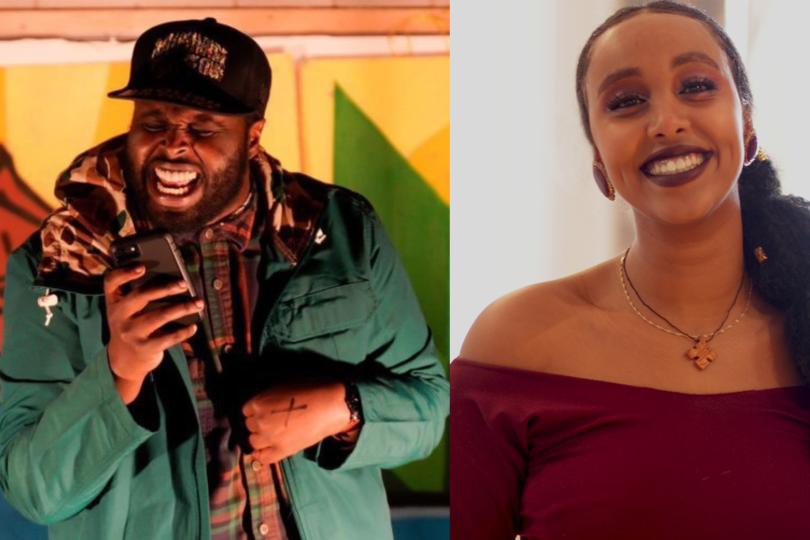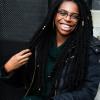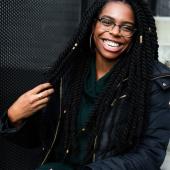The Renaissance of Black Art

I had the honor of speaking with Miss Mari and Farah Habad, two Twin Cities-based poets who continue to push the boundaries of what spoken word performance looks and sounds like. Between viral TikToks and Instagram Reels, and performances with Button Poetry, Miss Mari and Farah have already made waves that have touched the other ends of the earth. I believe that these two brilliant, beautiful, Black storytellers are Minnesota’s claim to poetic fame. Their work is a testament to the vibrant arts community in Minnesota. These two poets are a critical part of what Miss Mari calls, ‘a renaissance of Black art’ in the Twin Cities and nationwide.
Learn more about them and check out some of the highlights of our conversation.
Miss Mari is a Minneapolis poet and multidisciplinary artist whose work spans a diverse array of topics such as womanhood, Blackness, heartbreak, and love. Informed by her own triumphs and tragedies, her work is both empathetic and imaginative as it establishes a mindful intimacy with her audience, reminding others to be Romantic about their own lives and tender with their own hearts. Find her on TikTok and Instagram (@howshewrites).
Farah Habad is a poet and organizer based in Minneapolis by way of Oakland, with over a decade of experience in public speaking and performance. His commitment to bearing witness for his community translates directly to his approach and execution onstage, and he seeks to use performance as a community-building tool.
How did you get started with writing and performing poetry?
MM: It started off as something that I did on my own, as a form of escapism. In high school, a teacher noticed my writing and was moved by a specific piece I’d written. This teacher became my mentor, and she encouraged me to put my talents on stage. Towards the end of high school, I started developing the performance aspect of my poetry. I kinda let it go during college, and I didn’t even identify as an artist at that time. But I befriended a few poets, and as I watched them perform, it reminded me how much I used to love writing and performing. After graduating, I got back into performing in the Twin Cities. I performed at a few poetry slams. I won the Button Poetry Slam, and the ARAHA Poetry Slam. Then I eventually landed at Tangible, and I continued to perform at open mics and at summer festivals in and outside of Minnesota.
FH: When I was little, I would feel a lot. I didn’t come up in an environment that was conducive to articulating how you actually feel. The environment was receptive to the performance of being okay, but not the actuality of being okay. In seventh grade, I saw Amir Sulaiman’s poem ‘Danger’ on YouTube, and I was like oh, shit. This is amazing. I appreciated the way he was able to speak his sincere truth and allow the stage to serve as catharsis. And as a kid, I talked too much and I enjoyed getting reactions out of people, but I didn’t necessarily have a medium to control those reactions. Performance served as a means to channel that energy and as a way to understand others. Performance allowed me to access and get to my feelings, while still maintaining distance both personally and from the audience.
What does creative fulfillment look like for you? How do you know when you are creatively fulfilled?
MM: Creative fulfillment, for me, is always completion. If there is a place marker for it, it is usually after the poem is written. After it’s written, I’m focused on practice and memorization, so the performance comes across fluidly and naturally. But it’s the moment I realize I can’t edit the poem anymore, it’s finally done, and it’s now ready to go to those next phases that really define my creative fulfillment. Aside from creative fulfillment, there is also the emotional fulfillment after someone comes up to me and tells me how moved they are by my work. These moments don’t necessarily stroke my artist ego, instead I’m thinking, “thank goodness this poem was written in a way that someone in the audience felt touched by it.” And that’s always my intention, to make others feel seen and heard.
FH: I love silence in performance. I love pauses. Those are my checkpoints. Me and the homie used to do this thing before every performance…
Farah held his hand out, palm facing up, and he pointed to his palm with his other pointer finger.
…this is where we want everyone. Y’all are sitting here. We control the timing of everything. We hold that shit down, and it’s all in timing. I love that. I have felt the pinnacle of my performance. I know what that feels like. And because I approach artistry as a deeply personal thing, it is difficult for me to want to recreate that kind of performance. Now, it is a matter of understanding that my poetry is not just for me. It’s selfish to hold on to your gifts. They’re not yours, inherently. You’re a holder of it, but it’s not yours to keep. And that’s why you have it, is to be able to give it away.
Miss Mari, you’ve created a series of captivating videos on TikTok and Instagram Reels (@howshewrites on TikTok/IG) that in the first few seconds, seem like casual vlog-type videos, and then in a second they become these stunning, beautifully shot, cinematic displays of you reciting your poetry. Through this, you’ve amassed quite the following on social media. What inspired you to make this choice?
MM: I’m pretty self-aware of my social media habits. It’s pretty hard to hold my attention. I’m an infinite scroller, and quick things really grab my attention. I knew that if I wanted to showcase my art online, I had to make sure that it was interesting enough so someone like myself could enjoy it. I had to do the opposite of what I would do on stage, like conditioning the audience to appreciate silence, let shit sit, let the moment marinate. On social media, things are quick and short-form. There were a few things I had to figure out, like capacity in my apartment because all of my sets are built in-house, or using YouTube to learn how to edit my videos. But in order to adapt my poetry to how people operate on social media, I had to take the poems I had already written and condense them into 30 seconds to one-minute-long videos. Once I felt confident in my work, it was just a matter of posting it and letting it do what it do. I honestly turn off my notifications on social media, because I don’t want to know how the videos are performing. But that’s why I say my creative fulfillment is completion. As long as I have brought to life what was in my brain, that’s all I need in the moment.
Farah, your poetic short called Groundhog Day is brilliant. From what I understand, it centers the experience of a man, you, who is experiencing depression, numbness, and to quote you, maybe ‘feeling like a f*cking fraud’. Can you talk about your journey writing this?
FH: Western society is super individualistic. I don’t feel like humans are wired to be that way. And because we are so hyper-individualistic, I feel like all of us are just so silently lonely, and folks don’t talk about that shit. I’m trying to tap into my human nature of being communal. It’s important to know that I can reach out to someone, or hit people up when I need them. That energizes me. A lot of my writing is me writing my fears off. Knowing that hyper-isolation is the worst thing that could happen to me, I’ll write that off, so that it’s not on me and I can keep that off my chest. Yet, a lot of what I write is bearing witness. It’s not just about me. I try to find themes that a lot of us are feeling and ain’t talking about, and I try to chronicle it in an internal monologue.
The two of you are Tangible Collective’s first poetry fellows. Can you share more about your experience working with Tangible, and let us know what you’ve learned or gained so far in partnership with them?
MM: Ricki Monique and Za’Nia reached out to me, mentioning that they wanted to support some of the artists they had worked with in the past, and this is one of the pillars of Tangible. This residency offers us the resources to be more creative with our poetry. We get cameras and studio equipment, resources to get our headshots taken, and all the things that an artist would need to continue to advocate for their work. It is amazing to work with them, and it feels like we’ve grown up parallel to each other. When I was coming back to poetry and decided to take it seriously again, I first performed on their stage, when they were just becoming established. To be able to come back together and merge in this way is a dream come true.
FH: Ricki Monique and Za’Nia put me on to the concept of horizontal networking. We can all grind together to get where we need to be, and we don’t have to recreate the wheel. Everyone can be an expert in their specific space, and then we can come together to create something beautiful in the end. Learning directly from Black women as peers is something I need to do more of in all aspects of my life. Not only have I learned a lot from working with them, but nobody can put the battery in your back quite like Black women can. The level of certainty that they were able to give to me in the midst of my own uncertainty, was much needed.
What is next for you, performing and career-wise?
MM: I have a podcast episode and my fellowship video coming out with Tangible soon, as well as a studio video, all in the next month and a half. I’m not currently working towards a magnum opus in my career, but rather creating more bold projects and following my inspirations. so I’ll be putting out more music, graphics and videos.
FH: I have a film project with the Broadway Advocacy Coalition that will premiere on May 7th.
How can the Twin Cities performing arts community support you?
MM: I’m always interested in collaborating with other artists, anyone who wants to bring beauty and light into the world.
FH: Tell they white folks to be better. And abolish the police.




